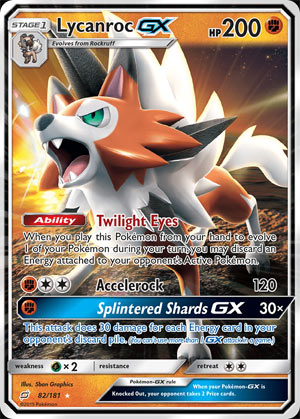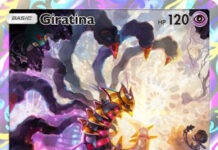
Lycanroc-GX
– Team Up
Date Reviewed:
March 13, 2019
Ratings Summary:
Standard: 3.25
Expanded: 3.00
Limited: 3.75
Ratings are based on a 1 to 5 scale. 1 is horrible. 3 is average. 5 is great.
Reviews Below:
 Vince Time to lunge with Lycanroc-GX (SM Team Up 82/181)! This is actually our third Lycanroc-GX card, but it takes the form of Dusk, while the previous cards were Midday form (SM Black Star Promo 14) and Midnight form (SM Guardians Rising 74/145, 138/145, 156/145). As a GX Pokemon, it has the usual baggage of having higher HP than it’s single prize counterparts, a GX attack, gives up two prizes, and benefit/excluded/hindered by certain cards. Being a Stage 1 is slower than a Basic in terms of having to wait for a turn to evolve and takes up additional deck space for evolving cards, although Ditto Prism Star makes Stage 1 more flexible. Being a Fighting Type is still good because it has support from both Standard and Expanded. It can hit some Colorless, Darkness, and Lightning Pokemon for double damage. 200 HP might be able to tank some hits, but Grass weakness, Choice Band, and Shrine of Punishment says otherwise. And a retreat cost of two is something you don’t want to pay for, and Escape Board still leaves you with a retreat cost of C. Lycanroc-GX has an ability and two attacks. Twilight Eyes states that if you use this card to evolve one of your Pokemon in play – Rockruff or Ditto Prism Star – you get to discard an Energy card from your opponent’s Active Pokemon. This is a one and done deal unless you have ways to make Lycanroc-GX leave play – like Super Scoop Up and Acerola – and evolve a different Pokémon in play, letting you use the ability again. This actually has good synergy with its GX attack, which we’ll get to it later. Accelerock costs FCC for 120 damage without any effects. The damage is good for the energy cost and is friendly towards Double Colorless Energy. The damage alone can already OHKO some prominent Pokémon such as Zoroark-GX and Pikachu & Zekrom-GX. Diancie Prism Star can help reach even more OHKOs such as Eevee & Snorlax-GX. Choice Band even helps reach certain OHKOs even if you don’t exploit weakness; 170 damage takes care of Tapu Lele-GX! Such a simple attack can be effective because of appropriate attributes. Splintered Shards GX costs F and does 30 damage for each energy card in your opponent’s discard pile. This is hugely dependent on your opponent’s side, which is not good. Most decks can recover energy cards, making that GX attack less effective. Fortunately, you can make it happen by your own methods. Twilight Eyes is a start, but you can even add in Team Skull Grunt, Enhanced Hammer, and Crushing Hammer to help put your opponent’s energy cards from their hand or their Pokémon into the discard pile. With Choice Band and Diancie Prism Star, you’ll need just nine energy cards in your opponent’s discard pile to OHKO almost all Pokemon in the game outside of HP buffs. This might seem demanding since most decks use 10-15 energies, you won’t be dealing that much damage, so it should be saved as a finisher or to KO GX Pokemon for easy prizes. As stated at the beginning, there are two other Lycanroc-GX cards. Midday form is a Stage 1 Fighting Type with 200 HP, weak to Grass, single retreat cost, and three attacks. Crunch costs FC for 30 damage and discards an Energy attached to your opponent’s Active Pokemon. Accelerock costs FFC for 120 damage. And Lycanfang GX also costs FFC, but for 200 damage and you have to discard 2 Energy attached to this Pokémon. It was reviewed on January 1, 2018. The reviewers were optimistic, but today’s card, I feel like the promo version is no longer needed. Midnight form is also a Stage 1 Fighting Type with 200 HP, weak to Grass, a retreat cost of two, an ability, and two attack. Bloodthirsty Eyes states that when you put this card to evolve one of your Pokemon in play, you can choose one of your opponent’s Benched Pokemon and switch it with the Active Pokemon – essentially an effect of Lysandre or Gust of Wind on an Ability. Claw Slash costs FCC for 110 damage. Dangerous Rogue GX costs FC and does 50 damage for each of your opponent’s Benched Pokemon in play. This one was reviewed as the 13th best card of SM Guardians Rising. Even now, this is still a good card and can be run alongside the new Lycanroc-GX. Most of the time, they are used for the ability, although it could be a good secondary attacker if you’re willing to make room for Fighting energy. So far, only one deck used today’s card on a recent tournament in Cannes, France. That deck took 29th place in that tournament, which is something. This card was included in Zoroark/Lycanroc deck for more utility. Not much for me to say, but that’s enough for me to be satisfied in Standard. Expanded adds even more cards to work with, at the cost of adding more counters against it. In Limited, if you pulled one, then use it unless you pull something better. Given the entire package of this card, it can be a supplement to existing decks, or it can even be the focus of a deck. Ratings:
|
 Otaku Lycanroc-GX (SM – Team Up 82/181) joins the Lycanroc family; while all the cards so far are named either “Lycanroc” or “Lycanroc-GX”, but some feature its Midday Form, others its Midnight Form, and some (like today’s) its “Dusk Form”. Today’s Lycanroc-GX has a lot in common with the previous promo Lycanroc-GX (SM – Black Star Promos SM14; SM – Burning Shadows 136/147, 155/147) and oft-used Lycanroc-GX (SM – Guardians Rising 74/145, 138/145, 156/145). Getting the obvious out of the way; this is a Pokémon-GX, giving up an extra Prize when KO’d, excluded from certain pieces of more general support, and targeted by certain detrimental card effects for it. Potentially balancing all that out are improved stats (usually HP) and effects (including having a GX-attack). All three are [F] Types, letting them benefit from Diance {*}, with even more options like Strong Energy available to them in the Expanded Format. Many [C] Types, most [D] Types, and most [L] Types are [F] Weak, though [F] Resistance is one of the most common forms AND can be found even among those three Types. Anti-[F] effects exist but even the best don’t appear to know competitive success. Being a Stage 1 means Lycanroc-GX needs an extra turn to hit the field and will have to Evolve from a Rockruff (or Ditto {*}); more slightly slower and a little more demanding than a Basic, as well as having to deal with different bits of Stage-based support and counters, but being a Stage 1 is still quite serviceable overall. All three Lycanroc-GX have 200 HP, which is a bit small for a Stage 1 Pokémon-GX. It is high enough that OHKO’s aren’t especially easy except for strategies built around them, BUT low enough that even decks normally shooting for 2HKO’s might manage a spike that does the deed with one shot. [G] Type attackers will have an easy time of it unless they aren’t focused on doing damage, thanks to all Lycanroc-GX being [G] Weak. They also all lack Resistance, so none of them will have even one matchup where they can fake having a sturdier HP score. The Retreat Cost of [CC] can be a pain but it isn’t too bad. Shifting gears to just Lycanroc-GX (SM – Team Up 82/181), it has one Ability, one regular attack, and one GX-attack. The Ability is “Twilight Eyes”, and you may only use it the turn you evolve one of your Pokémon in play into a copy of this card; you may discard an Energy attached to one of your opponent’s Active Pokémon. In other words, the Ability is a one-time “free” Team Flare Grunt; pretty good. The regular attack is “Accelerock” for [FCC] and doing 120 damage; again, that is pretty good in terms of the raw Energy required (120-for-three), the exact number it hits, and because it MOSTLY [C] for the requirements. Weakness means you’ll OHKO a Zoroark-GX, while the typical combination of Choice Band and Professor Kukui (or Diancie {*}) will let you OHKO a Tapu Lele-GX. “Splintered Shard-GX” needs [F] to be used; not great for splashing into off-Type decks, but fairly good. This GX-attack does 30 damage for each Energy card in your opponent’s discard pile. This works nicely with the Ability BUT is highly variable; some decks thrive on Energy in their discard pile, others at keeping their Energy from staying there too long (if they’re running much at all). All told, it is a good option to have but not something on which to rely. When it comes to actually using this card, we need to consider the other two Lycanroc-GX. Lycanroc-GX (SM – Black Star Promos SM14; SM – Burning Shadows 136/147, 155/147) actually feels like a “rough draft” of today’s version. It has two regular attacks and a GX-attack. The first attack, “Crunch” costs [FC] to do 30 damage and discard an Energy from your opponent’s Active (if there is one). Not bad, but not good either; needs to hit a bit harder or else cost a bit less. It also knows Accelerock and even also does 120 damage BUT it requires [FFC]. That slight difference hurts; you can’t splash it into off-Type decks as easily or take advantage of things like Double Colorless Energy. “Lycanfang-GX” also costs [FFC] and allows this Lycanroc-GX to attack for 200 damage BUT requires you discard two Energy from itself as well. Like Crunch, this isn’t bad but I wouldn’t call it “good” either; too many things outside of OHKO range and if you survive, you blew two Energy AND your GX-attack. Even though it impressed me when it was new, I expected too much out of it and what it can do, today’s Lycanroc-GX does better. What about Lycanroc-GX (SM – Guardians Rising 74/145, 138/145, 156/145)? It also has a coming-into-play Ability, named “Bloodthirsty Eyes”; you get to force an opponent’s Benched Pokémon into the Active position e.g. a one-time use of Lysandre as an Ability instead of a Supporter. [FCC] pays for its “Claw Slash” to do 110 damage; good but the 10 less damage does matter as it means whiffing on some key KO’s or investing extra resources for yet another damage buff. “Dangerous Rogue-GX” needs [FC] to do 50 damage times the amount of Benched Pokémon your opponent has in play; a nice big hit against most decks, but not every deck needs a big Bench and the cost needs acceleration or a turn of prep time. Bloodthirsty Eyes is strong enough that even with some shortcomings, Lycanroc-GX is used quite a bit in the competitive metagame. Whether in [F]-focused decks or backing up something like Zoroark-GX, the Bloodthirsty Eyes version can be found. Looking at the results out of the Collinsville, IL Regional Championship, today’s Lycanroc-GX doesn’t show up until the 14th place player’s deck, a Zoroark-GX/Lycanroc-GX build that does include both basic Fighting Energy card and Double Colorless Energy. Three other Lycanroc-GX using decks placed higher without today’s Lycanroc-GX, and even in that 14th place deck and a few others in the top 32, you’re only seeing one of the Twilight Eyes version… but that’s still really good, considering this was a massive event (1056 players in the Masters Division). I have no similar news for the Expanded Format; I don’t believe any Lycanroc-GX see much play here. If you decided to try them, though, I’d think one would still be tempting. Unless you can build a +39 deck around something like a Tag Team Pokémon or other Basic Pokémon-GX, run even a 1-1 line of today’s Lycanroc. If you can pay for its attacks, even better! Ratings Standard: 3.5/5 Expanded: 3/5 Limited: 4/5 You might not be able to make room for both Ability versions of Lycanroc-GX, but if you can you should! If you can’t, stick with the Bloodthirsty Eyes version. Assuming, of course, that your deck should run any at all; they work in many decks, but there are plenty that don’t need their help. |
We would love more volunteers to help us with our Card of the Day reviews. If you want to share your ideas on cards with other fans, feel free to drop us an email. We’d be happy to link back to your blog / YouTube Channel / etc. 😉
Click here to read our Pokémon Card of the Day Archive. We have reviewed more than 3500 Pokemon cards over the last 17+ years!



